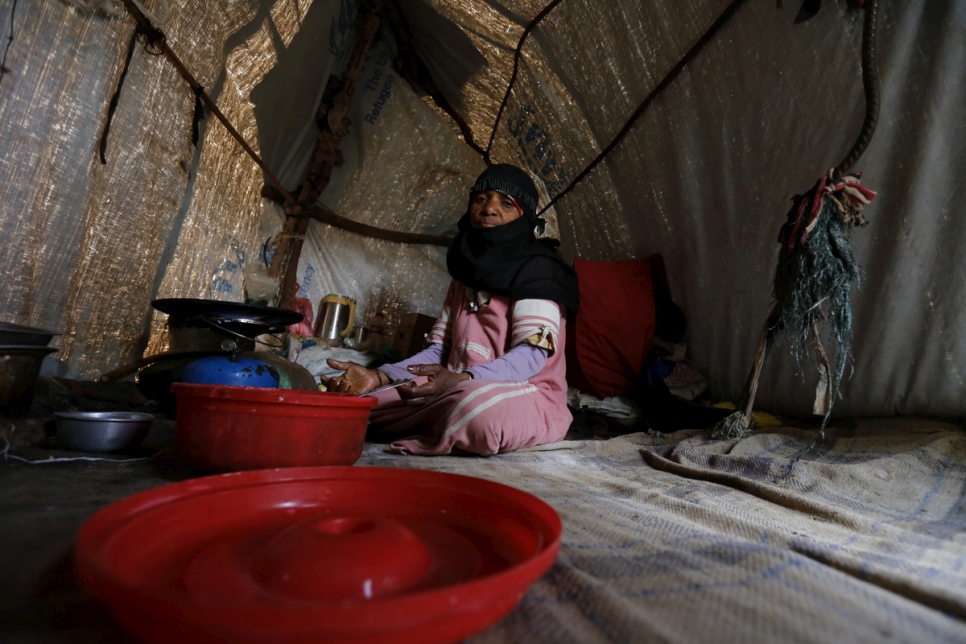Deaths through famine and lack of medical attention in the country are being aggravated as UN Refugee Agency relief operations are just one per cent funded.

Zahrah, a widow and mother of eight displaced by war, sits in a makeshift shelter in Sana’a, Yemen. © UNHCR/Mohammed Hamoud
GENEVA – People in war-ravaged Yemen are dying of famine and lack of medical attention in a situation now “beyond any humanitarian catastrophe,” UNHCR, the UN Refugee Agency, said today, warning that the crisis would likely worsen as humanitarian needs are acutely underfunded.
“There is significant famine, there are people dying because of lack of medical attention, there are people who are out of schools simply because the schools are being used as shelters for displaced people,” said UNHCR’s Representative in Yemen, Ayman Gharaibeh.
“We used to say last year that we were in a catastrophe. Now we’ve said that it is beyond any humanitarian catastrophe that we’ve seen,” he said, speaking on the sidelines of a news briefing at the Palais des Nations in Geneva.
“It is beyond any humanitarian catastrophe that we’ve seen.”
War reignited in the country of 27 million people in March 2015, creating a situation where fully two-thirds of the population – or some 18 million people – are now dependent on external aid in order to survive.
The situation facing many of the three million people displaced from their homes in Yemen is essentially a struggle for survival – food, water and shelter are priority.
Many are now enduring miserable and inadequate conditions living in overcrowded or makeshift shelters for months on end and without sufficient protection.
UNHCR’s Representative in Yemen highlights impact of funding shortfall
Providing an effective response is currently being hindered by an acute funding shortfall that has left UNHCR with just one per cent of the US$99.6 million it needs to continue its vital relief operations in the year ahead, Gharaibeh said.
“We are at the beginning of the year – we’re in mid-February – and it’s important that we have contributions in a timely, phased manner, with the pace to allow us to plan… in a way that will continue to provide that same level of assistance throughout the year,” he said.
Whereas in 2016, UNHCR spent US$76 million in its emergency response to different waves of displacement and stockpiling relief items in Yemen, Gharaibeh said it has started this year with just US$600,000 in its bank account.
Having a fully funded operation “gives us the opportunity to have different options, be it for shelter, be it for cash programming,” he added.
“Without resources… it really means that we will have more and more people languishing in the streets.”
In an example of the impact the funding shortage was having, Gharaibeh said UNHCR would not be able to follow through with financial assistance to some 2,000 vulnerable widows identified as in need.
“There have been assessments done in terms of vulnerability, but since that has not been matched with funding, it undermines our credibility, and the credibility of the response.
“Without resources we are not useful at all in Yemen. We need to be able to identify needs, identify who is deserving… and make sure we are able to respond.”
The current situation has been compounded by decades of neglect, which has left weak institutions, poor government, and a feeble economy.
“Every aspect of life is impacted and without this, it really means that we will have more and more people languishing in the streets. An unstable Yemen is not going to be a stable region, and that’s not in the interest of any of its neighbours.”
Share on Facebook Share on Twitter